

CloneOfDuty : Big Fat Zero. I knew I'd never... Xna:Tutorials:CLR Profiler - Docs. <- Back to Tutorials Introduction The CLR Profiler (CLR meaning Common Language Runtime) is a program created by Microsoft which gives detailed information about memory allocation and method calls.
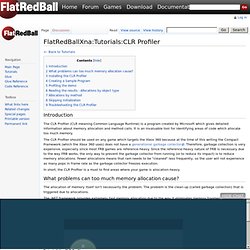
5 Tips and Techniques for Avoiding Automatic GC Collections. Automatic memory management isn't new, but it’s a wonderful thing for programmers.

We bring you some tips and techniques to .help you understand a bit more about how .NET’s memory management works, can help you to ensure that you write high-performance .NET code. The .NET garbage collector is, in general, a wonderful thing. It has freed countless programmers from the drudgery both of writing allocation and de-allocation code, and also of tracking down heap corruption and memory leaks (due to bad pointers or de-allocation errors). The cost of value types in .NET Compact Framework - Scott Holden's Blog. I often get asked about the difference in performance characteristics between value types (C# struct) and reference types (C# class or Object).
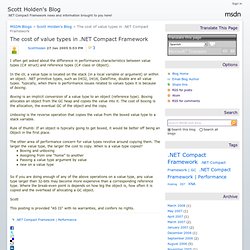
In the clr, a value type is located on the stack (in a local variable or argument) or within an object. .NET primitive types, such as Int32, Int16, DateTime, double are all value types. Typically, when there is performance issues related to values types it is because of boxing. Boxing is an implicit conversion of a value type to an object (reference type). Boxing allocates an object from the GC heap and copies the value into it.
The cost of boxing is the allocation, the eventual GC of the object and the copy. WP7, XNA, the GC, and You (and Silverlight too!) Some of you may have come across this helpful blog post recently, discussing when the garbage collector (a/k/a the GC) runs on Windows Phone 7 devices.
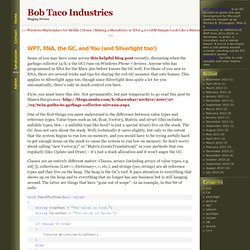
Anyone who has programmed in XNA for the Xbox 360 before knows the GC well. For those of you new to XNA, there are several tricks and tips for slaying the evil GC monster that eats frames. This applies to Silverlight apps too, though since Silverlight does quite a lot for you automatically, there’s only so much control you have. First, you must leave this site. Not permanently, but just temporarily to go read this post by Shawn Hargreaves: Happion Labs GameDevBlog: Stupid C# Tricks: Dealing With Non-Generational Garbage Collection. Mostly for Nathan: Better men than me have already discussed non-generational GC with XNA Xbox, and a few things you can do to deal with it.

Trying to build upon their work - your best buddy is going to be the CLRProfiler. Once you figure out how to use it, it's an awesome tool that tells you what's allocating the most garbage, when and where. Once you've found trouble spots, there's a variety of things you can do. Using structs instead of classes is often what you want - structs are put on the stack; and an array of structs is just one object. If there are moments in your game where pauses make sense, (when the user hits the pause button, for example - or in a turn-based game, the beginning of every turn, maybe?) XNA Framework Remote Performance Monitor.
XNA/C# Articles « gavpugh.com. This is simply an index to collect together the XNA and C# technical blog articles I have written.
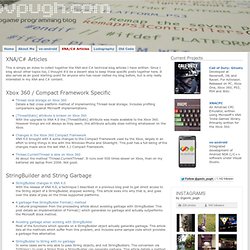
Since I blog about other topics too, I thought it’d be a decent idea to keep these specific posts together here. It also serves as an good starting-point for anyone who has never visited my blog before, but is only really interested in my XNA and C# content. Xbox 360 / Compact Framework Specific Thread-local storage on Xbox 360 Details a fast cross-platform method of implementing Thread-local storage. Includes profiling comparisons against Microsoft implementations. StringBuilder and String Garbage StringBuilder changes in XNA 4.0 With the release of XNA 4.0, a technique I described in a previous blog post to get direct access to the String object of a StringBuilder, stopped working.
Miscellaneous Retrieval of Date and Time a Game Was Built This article describes a technique that can be used to easily store a build timestamp in your game. An introduction. Managed Code Performance on Xbox 360 for XNA: Part 2 - GC and Tools - .NET Compact Framework Team. ...continuation of Part 1, it can be found here Memory and Garbage Collection One common concern for game developers is the garbage collector.
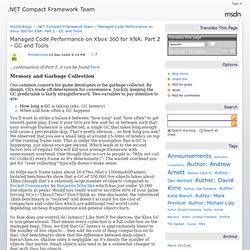
By design, GCs trade off determinism for convenience. Luckily, keeping the GC predictable is fairly straightforward. Two variables to pay attention to are: Games.DiscoverThat.co.uk. Home XNA Contents Development Blog Like most people developing using XNA for the Xbox 360 eventually I encountered the frustrating situation where every minute or so my game froze for a few moments.

With only the minimal of investigation the term Garbage Collection came to my attention. What is garbage collection? Garbage collection is the process used to remove unassociated items from the memory heap of the computer or console. This is necessary to make best use of the limited memory resources on the machine. Foreach, Garbage, and the CLR Profiler - Cornflower Blue. I've been doing a lot of thinking lately about foreach, and in what situations it may or may not create garbage.
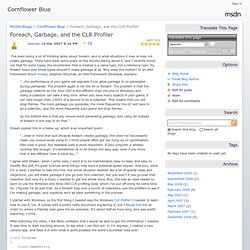
There have been some posts on the forums asking about it, and I recently found out that for some types, the enumerator that is created is a value type, not a reference type. So, foreach loops over those types shouldn't make garbage at all. Why does this matter? In an XNA Framework forum thread, Stephen Strychak, an XNA Framework Developer, explains: "...the performance of your game will degrade if you allow garbage to be generated during gameplay.
So the bottom line is that you should avoid generating garbage, and using for instead of foreach is one way to do that. " Shawn posted this in a follow up, which is an important point: "...bear in mind that just because foreach creates garbage, this does not neccessarily mean you should avoid using it! I agree with Shawn: when I write code, I want it to be maintainable, easy to read, and easy to modify. Generics in the .NET Compact Framework - Welcome to Live Mesh! Parametric polymorphism (aka Generics) is one of the most interesting new features added to .NET CLR and languages in version 2.0 (Whidbey).
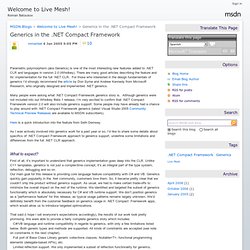
There are many good articles describing the feature and its’ implementation for the full .NET CLR. For those who interested in the design fundamentals of generics I’d strongly recommend the article by Don Syme and from Microsoft Research, who originally designed and implemented .NET generics.